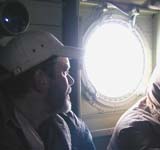Andrew
Maykuth Online
|
 |
On the chopper out of Bagram airbase. |
DUSHANBE,
Tajikistan - After all the hard work to get into Afghanistan two months
ago, getting out proved easier than anticipated.
I
woke up yesterday morning expecting to spend a day or two more in Kabul,
tidying up one final story, perhaps shopping for a rug. I planned to give
myself a week to get out of Afghanistan, allowing plenty of time for
flight delays due to bad weather or possibly having to drive out over the
snowy Hindu Kush.
I
heard about the flight at breakfast. NBC was expecting a plane to arrive
yesterday from Dushanbe, bearing fresh journalists to cover the war.
The
flight was scheduled to return the same day - practically empty, it was
said.
I
called the network contact person in Dushanbe who was organizing the plane
and got myself onto the manifest for the return flight.
Until
that moment, I wasn't in a hurry to wrap up my work on a story that had
consumed me since September. But now the same thing happened to me that I
had seen happen to several other hacks in recent months: The momentum had
rapidly shifted, homeward.
I
was packed and checked out in 30 minutes.
There
was a small group of journalists waiting outside Bagram military airport
about 25 miles north of Kabul, where the war's front line had been a few
weeks before. Now it is operated by U.S. Army troops.
The
plane was late, we were told. The flight's organizers were still
negotiating with the Tajiks and the Afghans over landing fees. Any number
of previous flights from Tajikistan had never showed up for the same
reason.
I
settled in with a book, figuring I'd spend the day waiting.
As
I sat, a few other flights landed: A U.N. cargo flight, a couple of
Russian helicopters. Meanwhile, messages kept coming back from Tajikistan
about our plane: Delayed. Still delayed.
Then
our fortunes turned. A man with a radio came out and asked if anybody
needed a lift on a Russian helicopter that was heading back to Dushanbe
after delivering some medical personnel to Kabul.
A
stampede ensued.
After
a quick check-in, we boarded the heavy-lift helicopter on the tarmac and I
strapped myself in to one of the fold-down seats.
As
the helicopter lifted off, I got an aerial view of the Shamali Plain, the
undulating farm region north of Kabul where I had spent a month waiting
for the Northern Alliance troops to attack the entrenched Taliban. The
flatland is surrounded on three sides by mountains that rise dramatically
to snowcapped peaks. We rose and headed north, across the highest of the
ranges, the Hindu Kush.
The
flight took a little less than two hours. The unpressurized cargo hold was
cold and the air was thin.
Three-quarters
of the helicopter's floor space was taken up by fuel tanks - the trip over
the 15,000-foot high mountains is energy-intensive. At its highest point,
the chopper passed just a few hundred yards beside the rocky peaks.
As
the helicopter set down on the runway in Dushanbe, the 16 journalists
broke into applause. But I felt strangely glum.
For
nearly 10 weeks, I had felt as if I owned this story.
Each
day, as the country revealed itself, I grew increasingly captivated by
Afghanistan's complexity and rich detail. It is a beautiful place with a
horrible history. Many of the Afghans I met were gracious and thoughtful,
and I admired their colorful language.
Now
I am leaving the war as its endgame is being played out. I am sitting in a
cheap, poorly heated hotel room in Dushanbe that is luxurious by the
standards to which I have become accustomed. A small television set sits
before me with images of Afghan politicians in Bonn, signing an agreement
for a transitional government. I haven't seen international television for
10 weeks.
With
the signing of the agreement, there is a sense of optimism about
Afghanistan, a sense that warring factions can put aside their differences
and form some sort of unified government.
But
there is also much reason for caution.
In
1992, when mujaheddin factions ousted a Soviet-installed government, Kabul
was at peace for only a few months before war broke out among the
factions. The trigger: They were unable to agree on a long-term
government.
The
book I was reading as I flew out of Afghanistan puts the nation into an
even longer historical view.
The
Life of Abdur Rahman is the autobiography of the man who ruled Afghanistan
at the end of the 19th century. It is a story of violence and political
intrigue, a story about clan leaders who form alliances one day and stab
their allies in the back the next.
A story that - if not for the Victorian prose - could have been written last week.